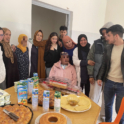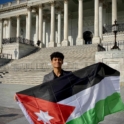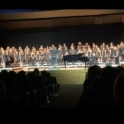Maryame has taken the lessons learned from her exchange year to make a difference in her community.
STORIES
Alumna Develops App for People with Disabilities
By Qurrata A’yuna Adrianus (YES 2013-14, Indonesia, hosted by AFS-USA in Vancouver, WA)
Studying abroad for almost a year was really a life-changing experience for me. My name is Qurrata A’yuna Adrianus, but my family and colleagues call me Yuna. Back in 2013, I was given an opportunity from the YES program to live a different life, far from home, yet in a country that would become like another home. I was a YES exchange student from Indonesia, hosted in Vancouver, Washington.
In 2009, an earthquake struck my hometown. I was trapped under debris and needed to have both my legs amputated. Since then, I’ve been living my life using a wheelchair, and I am considered a person with physical disabilities. At first, I wasn’t sure how to navigate my life as a person with disabilities (PwD). However, getting the chance to live in the U.S. as an exchange student and as a PwD helped me to build another perspective about disability and being an independent individual.
I was able to observe that PWDs in the U.S. have more opportunities to live independently and inclusively. The government helps provide people with disabilities with facilities and services in order to cover their needs in daily activities. The community also has more understanding towards people with disabilities and their needs. In addition, accessibility issues are covered by the Americans with Disabilities Act (ADA), the civil rights law that prohibits discriminations against PwDs in many life sectors. Meanwhile, in Indonesia, living as a PwD is quite different. Not that it is worse or better, but issues related to disability were not really a concern to the community before. Yet, Indonesians are starting to think about the life of PwDs and have been working on solutions to accessibility and other issues.
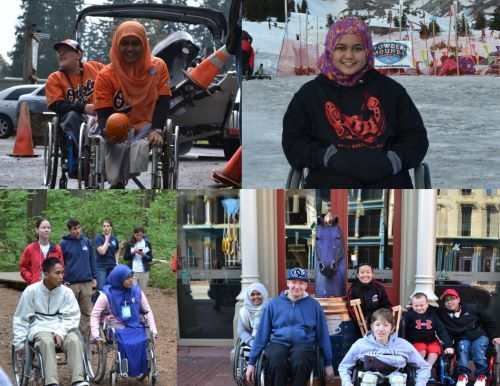
As someone who has physical disabilities in Indonesia, one of the problems that I’ve been facing, which is also common for other PwDs, is to find accessible facilities in many public places. Currently, it can be difficult to find accessible features like toilets and ramps in older public facilities. Plus, there are issues with not only accessing the facilities themselves, but also accessing information about these facilities. This can be a cause of stress for people with disabilities and can hinder daily activities if they’re not sure if they can access certain spaces, even though it is very common that the community in Indonesia is very helpful on many occasions. However, inspired by the ADA to not discriminate against people with disabilities, I tried to do something that can be helpful for PwDs and their communities.
My idea started in 2019, when I worked on my bachelor’s degree thesis research. Since I majored in Computer Science, I wanted to use technology to do or build something that was impactful for me and people around me. So I decided to work on designing a new mobile application, called BisaGo, that suits the needs of various users, including people with disabilities and non-disabled people. The application provides information about local public facilities for people with disabilities. In order to gather the data provided on the app, everyone can also share information about the facilities through this app.
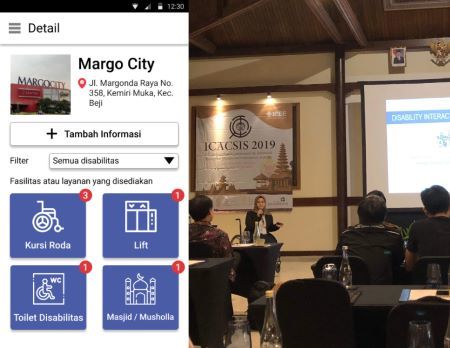
After approximately 4 months of research, I proposed a design that covers the needs of people with physical and/or sensory disabilities. The next step was to make the application available to the user. Luckily, a team of students in my campus is working to make this application available by the middle of 2020. Although there's no app that works perfectly on the first round, this app still needs some improvements before it can be released to the community. Hopefully, this app can help people with disabilities in Indonesia have better access to information and thus reduce the stress of visiting public places, with or without guidance. Also, I hope this app can enable the community to help each other and build inclusivity. I also hope that the app will get support from the community and the government. The spectrum of disabilities is so wide that gathering the needs for every person with disabilities can be very difficult. As technology develops, we need to consider the perspectives of people with disabilities. This might take a long time, but giving it our best is one thing we can do.
In 2018, I attended a regional YES alumni workshop in Malaysia, Inclusive Society: Looking at Abilities not Disabilities. At the workshop I learned a quote from John Donne, “…no man is an island entire of itself, every man is a piece of the continent, a part of the main.” This quote is very meaningful to me. In order to make the community thrive, everyone must be included, and everyone has value, no matter who they are or what disability they have. My experience on the YES program taught me that disabilities don’t make someone weak. Actually, disability means a different yet meaningful perspective on life.
I am so thankful that I was given an opportunity to live and study in the U.S. with the YES program. It was only a year, but the impact will last forever. Thank you to the U.S. Department of State for giving me this life-changing experience. I’d also like to say thank you to the Indonesia YES Alumni Association and AFS Bina Antarbudaya for giving me so many opportunities to be included in this program and the YES community.


